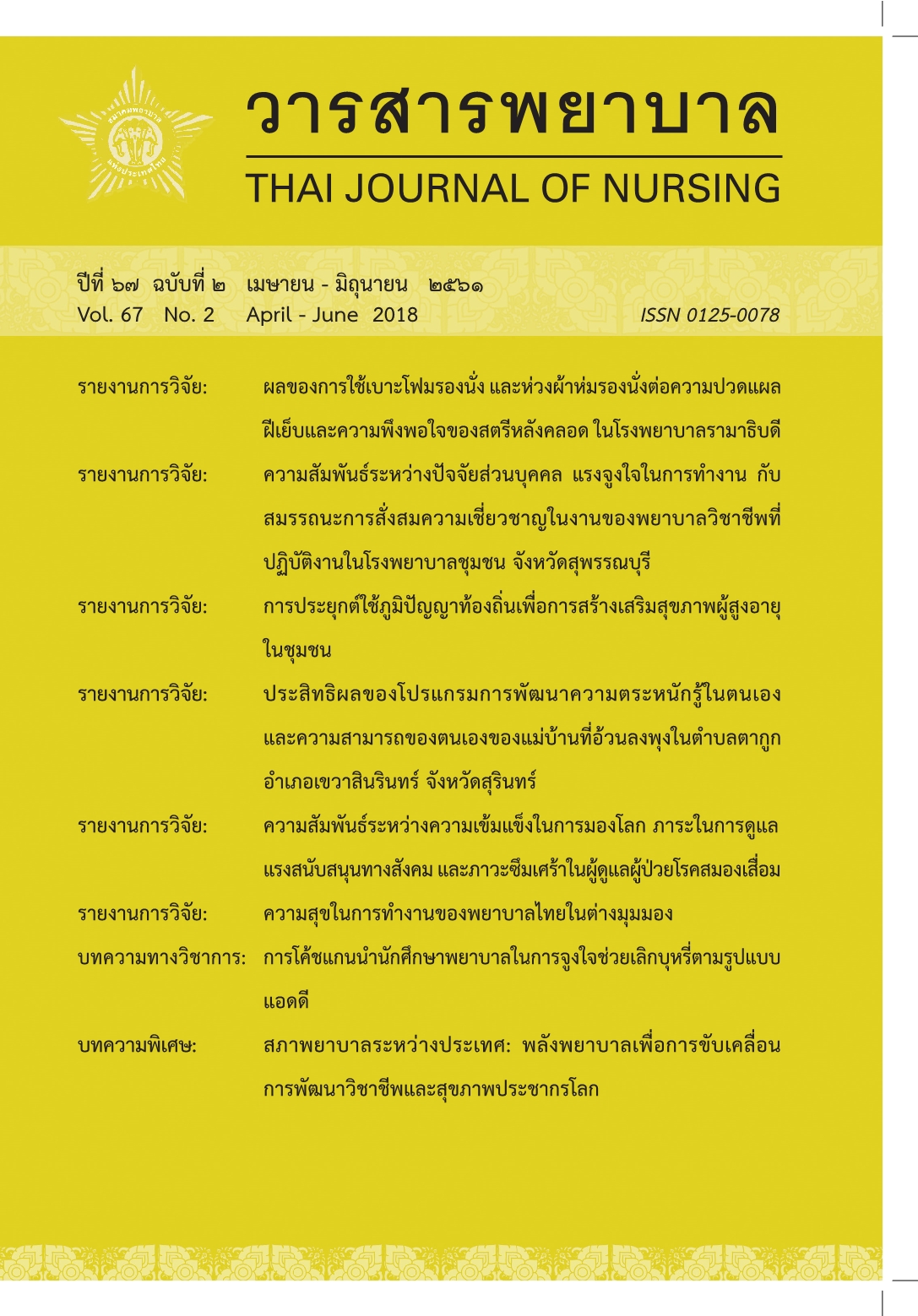Relationships between sense of coherence, burden, social support and depression among caregivers of dementia patients
Main Article Content
Abstract
The purpose of this descriptive correlational study was to examine depression among caregivers of dementia patients and test its relationships with sense of coherence, burden, and social support among caregivers of dementia patients. The sample of 90 caregivers of dementia patients from the Queen Savang Vadhana Memorial Hospital, was purposively selected. Research instruments consisted of five self-report questionnaires including personal information, Beck’s Depression Inventory, Sense of coherence, Caregiver Burden of Patient with Dementia and Social Support Scale. Descriptive statistics were employed to analyze the data. The results revealed that 73.32% of caregivers of dementia patients had depression. For depression caregivers, 20% had mild depression, 16.66% had moderate depression, 31.11% had high depression, and 5.55% had severe depression. From correlational analysis, it was found that depression had significantly positive correlation with burden (r = 0.628, p < .05) and had negative correlation with social support among these caregivers (r = -0.223, p < .05). On the other hand, sense of coherence was not significantly correlate with depression (r = 0.135, p > .05).
Article Details
References
การจัดการตนเอง การเผชิญปัญหา ความร่วมมือในการใช้ยากับภาวะซึมเศร้าในผู้ป่วยเบาหวาน
ชนิดที่ 2. วารสารเกื้อการุณย์, 22(2), 107-121.
ชุติมา นิติสิงห์. (2552). ความสัมพันธ์ระหว่างการรับรู้ความสามารถของแม่ในการดูแลลูก แรงสนับสนุน
ทางสังคมกับภาวะซึมเศร้าในแม่ที่มีบุตรวัยแรกเกิดถึงหนึ่งปี. วารสารสาธารณสุขและการพัฒนา,
7(2), 97-117.
ชนัญชิดา ดุษฏีทูลศิริ, รัชนี สรรเสริญ, และวรรณรัตน์ ลาวัง. (2554). การพัฒนาแบบวัดภาระในการดูแล
ของผู้ดูแลผู้ป่วยเรื้อรัง. วารสารการพยาบาลและการศึกษา, 4(1), 62-67.
เชิดชาย ชยวัฑโต. (2559). การศึกษาภาวะซึมเศร้าในผู้ดูแลผู้ป่วยอัมพาตหลอดเลือด. วารสารแพทย์เขต
4-5, 35(1), 14-27.
เดือนแรม ยศปัญญา. (2555). ผลของโปรแกรมส่งเสริมความเข้มแข็งในการมองโลก ต่อคุณภาพชีวิตผู้ดูแล
ผู้ป่วยผู้ป่วยจิตเภทในชุมชน. วิทยานิพนธ์พยาบาลศาสตรมหาบัณฑิต สาขาการพยาบาลจิตเวชและ
สุขภาพจิต, จุฬาลงกรณ์มหาวิทยาลัย.
บุญใจ ศรีสถิตย์นรากูร. (2553). ระเบียบวิธีการวิจัยทางพยาบาลศาสตร์ (พิมพ์ครั้งที่ 5). กรุงเทพมหานคร:
ยูแอนด์ไอ อินเตอร์ มีเดีย.
ภัทราภรณ์ ทุ่งปันคำ, และประภาศรี ทุ่งมีผล. (2548). การสนับสนุนทางสังคมความพร้อมในการดูแลและ
ความเครียดของมารดาเด็กออทิสติก. วิทยานิพนธ์พยาบาลศาสตรมหาบัณฑิต สาขาวิชาสุขภาพจิต
และการพยาบาลจิตเวช, คณะพยาบาลศาสตร์ มหาวิทยาลัยเชียงใหม่.
วสสรณ์รดี ภาคภากร. (2559). ความชุกและปัจจัยที่สัมพันธ์กับภาวะซึมเศร้าของผู้ดูแลผู้ป่วยโรคหลอด
เลือดสมองที่พาผู้ป่วยมารับการรักษา ณโรงพยาบาลจุฬาลงกรณ์. วิทยานิพนธ์วิทยาศาสตร
มหาบัณฑิต, ภาควิชาจิตเวชศาสตร์ จุฬาลงกรณ์มหาวิทยาลัย.
วีรศักดิ์ เมืองไพศาล. (2555). การดูแลผู้ป่วยภาวะสมองเสื่อม: จากการป้องกันถึงการดูแลผู้ป่วยในระยะ
สุดท้าย การป้องกันภาวะสมองเสื่อม อายุรศาสตร์ทันยุค 2555. กรุงเทพมหานคร: ภาพพิมพ์.
โสรนี โหราสุทธิ์, ศิริพงษ์ โพธิศักดิ์, และ แจค แกนเดอร์. (2540). Thai Version of the Beck Depression
Inventory (BDI). วารสารสวนปรุง, 13(1), 22-28.
สำนักงานสถิติแห่งชาติ. (2555). สถิติโรคสมองเสื่อม. กรุงเทพมหานคร: ผู้แต่ง.
สมจิต หนุเจริญกุล. (2532). สิ่งรบกวนในชีวิตประจำวัน ความเข้มแข็งในการมองโลก และการรับรู้
ถึงความผาสุกในชีวิตอาจารย์พยาบาลในมหาวิทยาลัย. วารสารพยาบาล, 38(3), 169-190.
Beck, A. T. (1967). Depression: Clinic, experimental and theoretical aspects. New York: Hoeber
Medical Division.
Eriksson, E., & Lauri, S. (2000). Informational and emotional support for cancer patients’ relatives.
European Journal of Cancer Care, 9(1), 8-11.
Pearlin, . I., Mullan, J. T., Semple, S. J., & Skaff, M. M. (1990). Caregiving and the stress process:
An overview of concepts and their measures. The Gerontologist, 30(5), 583-594.
Tyerman, A., & Booth, J. (2001). Family interventions after traumatic brain injury: A service example.
NeuroRehabilitation, 16(1), 59-66.
Weilland, S., & Shellenbarger, T. (2002). Family caregiving at home. Home Healthcare Nurse,
20(2), 113-119.
World Health Organization and Alzheimer’s Disease International. (2012). Dementia: A public health
priority. Geneva, Switzerland: WHO press.


